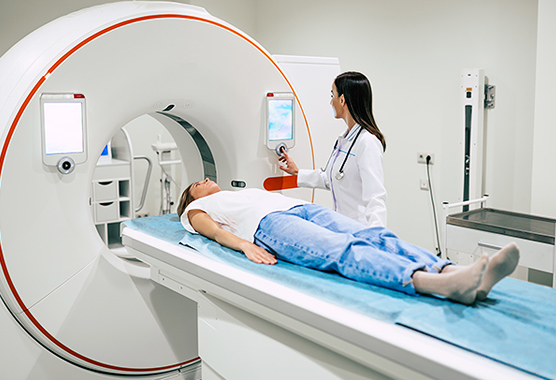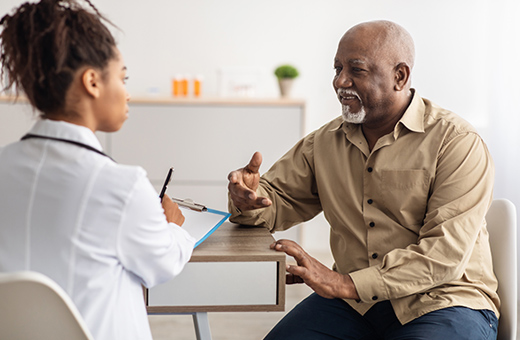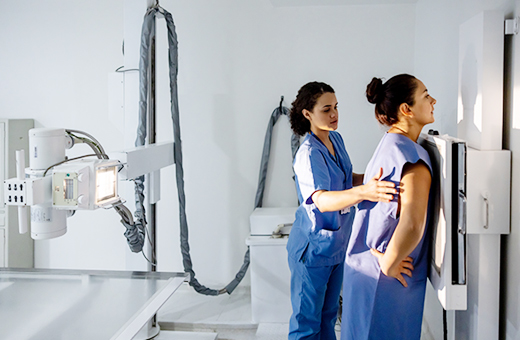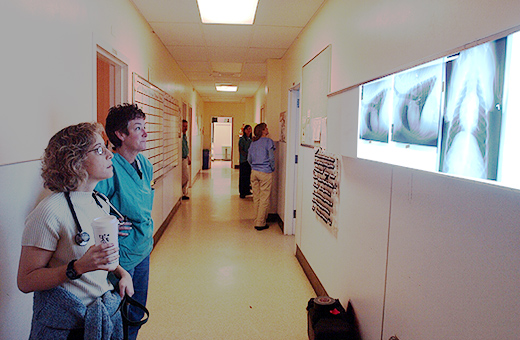Thoracic Radiology
We offer personalized radiology tests to diagnose your condition accurately and quickly, so you feel confident moving ahead with care.
Medically reviewed by Elizabeth Morris, M.D. on Aug. 30, 2023.

World-Class Care from Experts in Thoracic Imaging
Thoracic radiology uses medical imaging to diagnose conditions that affect your chest. This includes your lungs, the lining of your lungs and your chest wall.
At UC Davis Health, our Cardiothoracic Imaging Section specializes in both thoracic and cardiac imaging. You’ll receive the highest quality, individualized care from fellowship-trained thoracic imaging specialists.
Types of Chest Imaging at UC Davis Health
Your provider will order chest imaging to diagnose a condition in your lungs or chest wall. You may have one or more imaging tests based on your symptoms. Our chest imaging tests include:
Chest CT Scan
A chest CT (computed tomography) scan is a series of X-ray images that provide several views of your chest. We may give you a contrast dye to take by mouth or injection. The dye helps us see and diagnose certain chest abnormalities.
Chest X-Ray
We will take chest X-rays from the back and side of your body. An X-ray helps us see conditions like pneumonia or chronic obstructive pulmonary disease in your lungs.
Thoracic MRI
An MRI (magnetic resonance imaging) uses a magnet and radio waves to create detailed images of your chest. MRI technology helps us detect conditions like blood vessel abnormalities in your chest.
Request an Appointment
As Sacramento's No. 1 hospital, you'll benefit from unique advantages in primary care and specialty care. This includes prevention, diagnosis and treatment options from experts in 150 specialties.
Referring Physicians
To refer a patient, submit an electronic referral form or call.
800-4-UCDAVIS
Patients
Call to make an appointment.
Consumer Resource Center
800-2-UCDAVIS
-

The Day of Your Imaging Test
Tell your provider about any medical devices or metal you have in your body and whether you might be pregnant. We may give you a hospital gown to wear, depending on your test. Leave your jewelry at home.
-

During Your Imaging Test
For an X-ray, you will stand in front of an X-ray machine while a technician takes images. CT scans and MRI imaging require you to lie on a table during your test.
-

When Your Test Ends
You will go home after your test. You’ll need a friend or family member to drive you home if you had sedation.
After Your Imaging Test
Most imaging tests require no recovery time. If you had sedation, the medicine may stay in your system for up to 24 hours. Do not drive or operate machinery during this time.
Drink Water
Drink plenty of water for the rest of the day if you had an imaging test with contrast. This helps flush the contrast from your system.
Watch for Side Effects
Although rare, some people have side effects when they receive contrast dye. These may include a headache, nausea and pain at your IV site.
Resume Normal Activities
You may resume your normal daily activities and diet if you did not have sedation.
When to Contact Your Provider
Contact your provider if you experience an allergic reaction to contrast dye, like hives, itchy eyes or a rash.

Ranked among the nation’s best hospitals
A U.S. News & World Report best hospital in cardiology, heart & vascular surgery, diabetes & endocrinology, ENT, geriatrics, neurology & neurosurgery, and pulmonology & lung surgery.

Ranked among the nation’s best children’s hospitals
U.S. News & World Report ranked UC Davis Children’s Hospital among the best in neonatology, nephrology, orthopedics*, pediatric & adolescent behavioral health, and pulmonology & lung surgery. (*Together with Shriners Children’s Northern California)

Ranked Sacramento’s #1 hospital
Ranked Sacramento’s #1 hospital by U.S. News, and high-performing in aortic valve surgery, back surgery (spinal fusion), COPD, colon cancer surgery, diabetes, gynecological cancer surgery, heart arrhythmia, heart failure, kidney failure, leukemia, lymphoma & myeloma, lung cancer surgery, pacemaker implantation, pneumonia, prostate cancer surgery, stroke, TAVR, cancer, orthopedics, gastroenterology & GI surgery, and urology.

The nation’s highest nursing honor
UC Davis Medical Center has received Magnet® recognition, the nation’s highest honor for nursing excellence.

World-class cancer care
One of ~59 U.S. cancer centers designated “comprehensive” by the National Cancer Institute.

A leader in health care equality
For the 13th consecutive year, UC Davis Medical Center has been recognized as an LGBTQ+ Healthcare Equality Leader by the educational arm of America’s largest civil rights organization.
